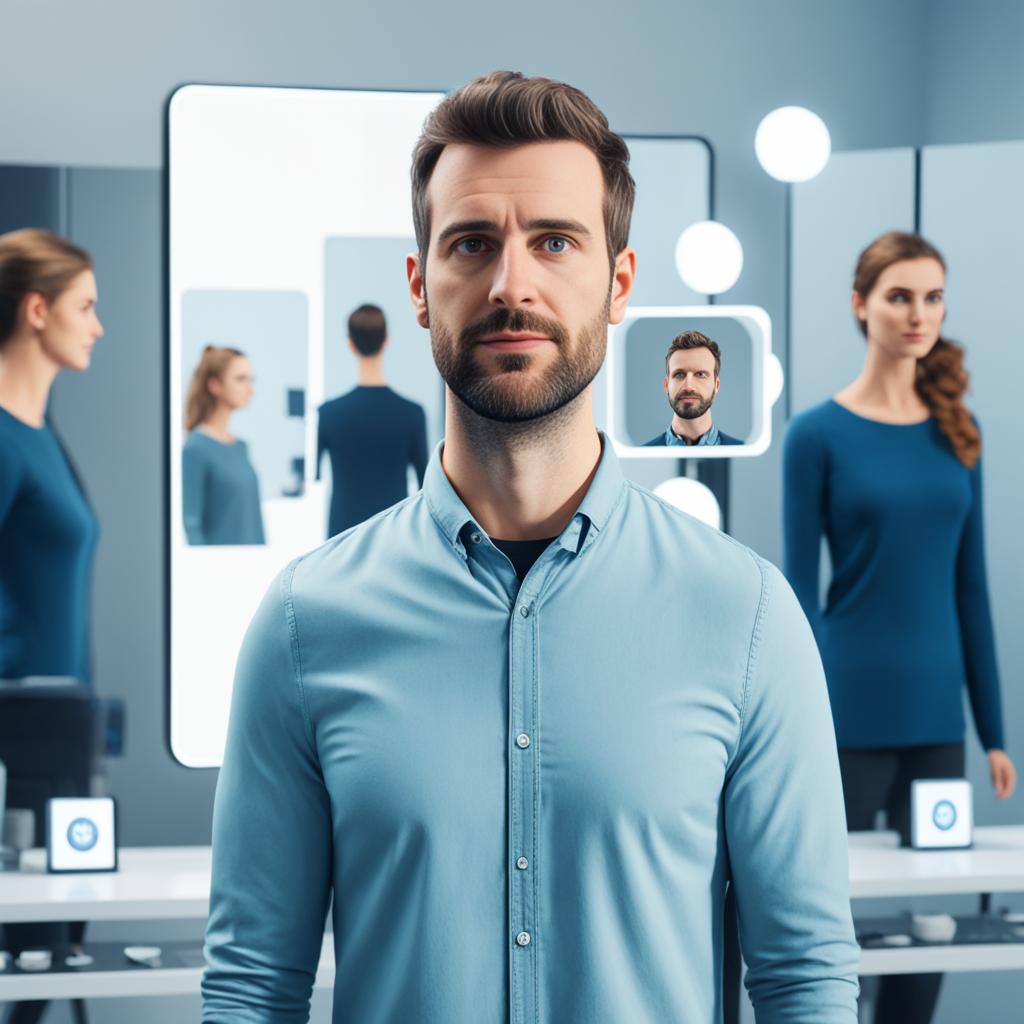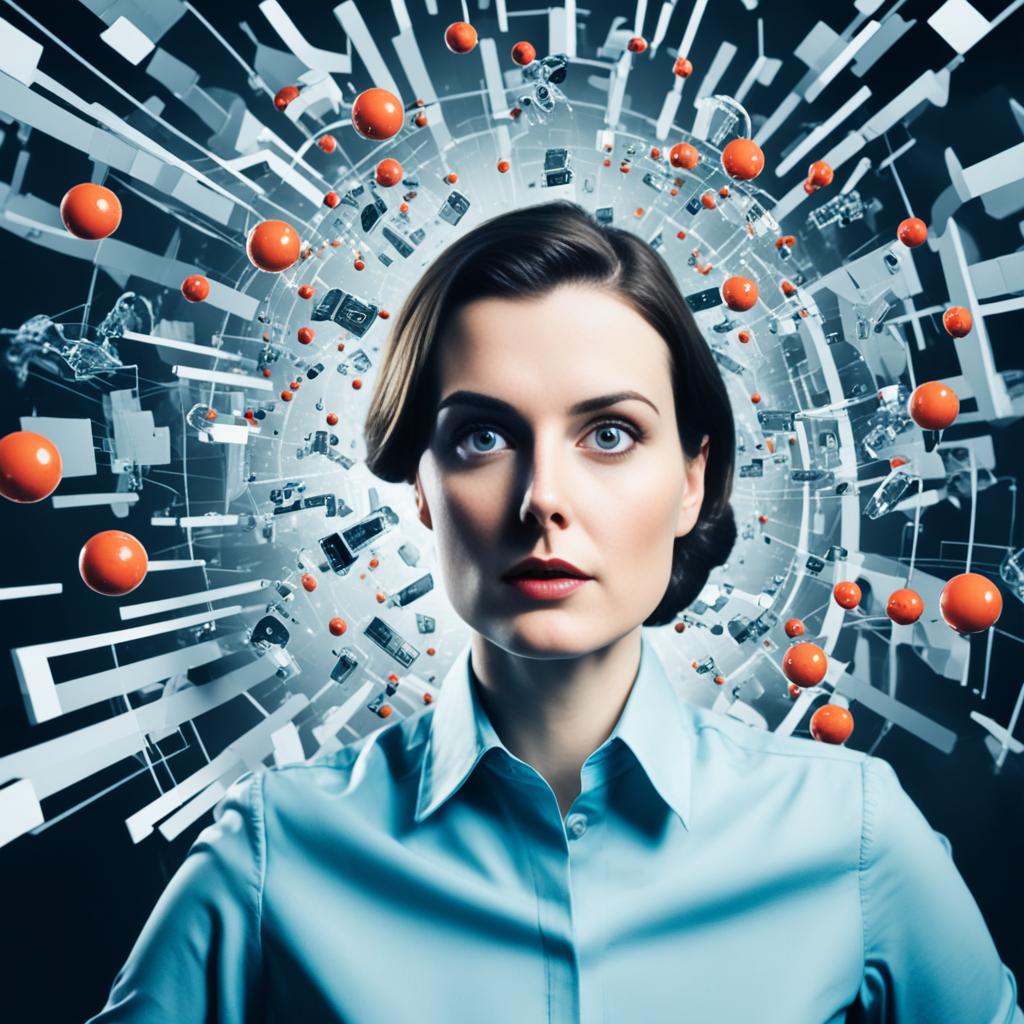Did you know the average person uses AI like Siri or Alexa over 76 times a day? They range from simple to complex tasks. This shows how AI is changing how we think and connect with others. It’s important to understand how AI affects us, not just for geeks but for everyone.
AI’s role in our lives makes us wonder how it changes our thinking and relationships. AI can help us do things better. But we must use it wisely and not too much. It’s like exploring new territory. We must look at the good and bad sides of AI in our lives.
Key Takeaways
- Grasping the scale at which daily AI interactions influence our cognitive and social behaviors.
- Identifying ways AI can enhance intellectual skills without diminishing creativity and critical thinking.
- Understanding AI’s impact on humans, particularly on social skills in both virtual and physical spaces.
- Reconciling the benefits of AI assistance with the need for human autonomy and decision-making prowess.
- Preparing for future AI integration with the awareness of preserving human touch in our social, educational, and professional spheres.
Enhancement of Intellectual Capacities
AI has changed how we boost our brain power. It uses smart algorithms to learn and analyze fast. This has reshaped learning, thinking, and solving problems. However, we must use AI wisely to keep our own thinking skills sharp.
AI as a Cognitive Tool
AI mimics how we think, making decisions smarter and creativity soar. It speeds up research, helping experts learn more. In business, it improves planning with forward-looking analysis.
For students, AI tailors learning to each person’s style. This makes education better for everyone.
Risks of Overreliance
Too much AI can weaken our problem-solving and thinking skills. It might make us less active in solving problems. To avoid this, mix human intelligence with AI. This way, we get the best results.
| Aspect | With AI as a Cognitive Tool | Risks of Overreliance |
|---|---|---|
| Decision-Making | Enhanced by predictive analysis | Diminished intuition and judgment |
| Learning | Personalized educational paths | Reduced critical thinking development |
| Innovation | Amplified by data-driven insights | Overdependence on algorithmic solutions |
| Data Analysis | Accelerated and comprehensive | Lack of depth in understanding |
Using AI boosts our brain skills, but we must be careful. We need to keep using our own minds too. Mixing AI with human thinking keeps us smart and innovative.
Impact on Social Skills
The spread of artificial intelligence (AI) affects how we grow our social skills. It is important to see how AI changes the way we interact. Technology is becoming a big part of our social lives.
AI in Social Contexts
AI is now a big player in social settings. It affects our social skills. AI helps create virtual chats that feel quite real. This changes how we talk to each other online.
Virtual talks have become more common, thanks to AI. They offer new ways to connect. These connections rely on AI understanding us like humans do.
Virtual vs. Real Interactions
Comparing virtual and real chats is interesting. AI makes talking easier and can reach many people. But real talks have value virtual ones can’t match.
Virtual chats try to mimic human touch. But real conversations capture emotions and subtle cues better. This is key for truly deep connections.
| Aspect | Virtual Interactions (AI-driven) | Real Interactions (Human-driven) |
|---|---|---|
| Communication Speed | Rapid response times | Dependent on human availability |
| Emotional Depth | Emotion recognition improving, but limited | Rich emotional nuances |
| Body Language | Lacks physical presence | Includes gestures, posture, and other cues |
| Empathy | Algorithmic predictions of empathy | Genuine empathetic engagement |
| Scalability | High capacity for simultaneous interactions | Limited to one-on-one or small group interactions |
We need to balance virtual and real chats. This will help AI improve our social skills, not harm them. The goal is to use AI to support, not replace, human connections.

AI in Education and Learning
AI in education brings new ways to personalize learning. It changes the old “one-size-fits-all” teaching model. Now, education fits each student’s needs, making learning more fun and efficient. AI helps by finding out what students do best and how they like to learn. As AI gets better, it can give students and teachers more helpful and customized learning experiences.
Personalized Learning
AI systems can check how students are doing right away. They can change how hard tasks are. They also change what materials to use to match each student’s learning style. AI in learning cares about how well students do in school. But it also looks at what keeps them interested and happy as they learn. When learning is tailored to them, students get more involved and do better.
Through AI in education, we are witnessing a transformation from passive learning to active, personalized educational journeys that recognize each student’s unique path to understanding.
Potential Pitfalls
AI offers big benefits for personalized learning but it’s important to watch out for downsides. Keeping students’ information private and making sure AI is clear and right is a big worry. Depending too much on AI might mean students miss out on personal help from teachers. Teachers give support that tech can’t always give. So, using AI the right way is very important.
Thinking about AI in education means looking at the good and the bad. We have to keep an eye on privacy and the value of teachers. AI can improve learning a lot. But we have to make sure it also helps students grow as people. This prepares them for a complicated future.
Workplace Implications
The arrival of AI has sparked major changes at work. It starts a new age of collaborative intelligence. This mixes machine analysis with our creative and strategic minds. It’s crucial for both businesses and workers to grasp these changes and chances.
Collaborative Intelligence
Collaborative intelligence is all about AI and humans boosting each other. AI handles huge data, giving quick, precise insights. Humans add deep judgment and social skills at work. Yet, combining these strengths requires a new work mindset and ongoing learning.
Social Skills at Work
Adding AI to our jobs doesn’t lessen the need for social skills at work. In fact, it makes them more important. As machines do routine jobs, skills like empathy and emotional smarts stand out more. There’s a growing need for people who work well with both AI and others. This shows how vital human connection still is.
Now, employers see the value in bettering these skills. They’re adding training to boost emotional smarts, communication, and teamwork. These are things AI can’t mimic. These skills matter for working with diverse teams and in AI-rich jobs.
| AI-Augmented Skill | Human-Centric Skill | Workplace Outcome |
|---|---|---|
| Data Analysis | Strategic Decision-Making | Enhanced Business Insights |
| Automation of Tasks | Creative Problem-Solving | Increased Innovation |
| Pattern Recognition | Emotional Intelligence | Improved Team Dynamics |
| Predictive Modeling | Ethical Judgment | Responsibly Harnessed Technology |
AI changes how jobs work, but humans are still key. Our empathy, ethics, and complex relations can’t be replaced. As we deal with these workplace implications, boosting our own skills and using advanced tech is crucial. This helps us thrive in a future with AI.
Ethical and Psychological Considerations
In the world of artificial intelligence, thinking about ethics and psychology is key. AI has become a big part of our lives. It brings up many challenges and concerns we need to look at. Understanding our dependence on technology helps us start to figure out how humans and AI interact.

Dependence on Technology
AI makes things easier and faster for us. But, we worry about relying too much on it. Our own ability to solve problems could get worse if we depend on AI for tough tasks. We need to think about how this affects our minds as we find a balance between our own creativity and AI’s smarts.
Privacy and Personal Interaction
Privacy is a big deal when we talk about AI ethics. AI uses our personal data to help us in ways that fit us best. But, this could challenge our privacy rights. Knowing how our data is used is very important. Also, AI changes how we interact with each other. This can change our social lives and affect our mental health. We must carefully look at and control the crossroads of privacy and personal interaction in the AI age.
Future Outlook
The horizon of artificial intelligence (AI) opens new paths for us. The future outlook makes us think about how to use these advancements well. We must make sure that our society is ready and active in preparing for the future AI will shape. It’s important to combine AI with our everyday lives in a way that boosts human skills instead of replacing them.
Preparing for the Future
Getting ready for what’s coming means always being eager to learn and adapt. Upskilling and reskilling are key, helping people adjust to AI’s changes. It’s all about being flexible, letting both people and groups smoothly handle the new tech age. Educational reforms are crucial for this flexibility, making us all more able to embrace AI’s changes with strength and quickness.
Educational Reforms
Education needs to change to get ready for AI’s role in our lives. These changes should focus on teaching how to think deeply, be creative, and understand emotions better. By growing these human skills, people of all ages will do well even as AI becomes more used. This way, education will lead us to a future where AI helps everyone and matches our global values.

